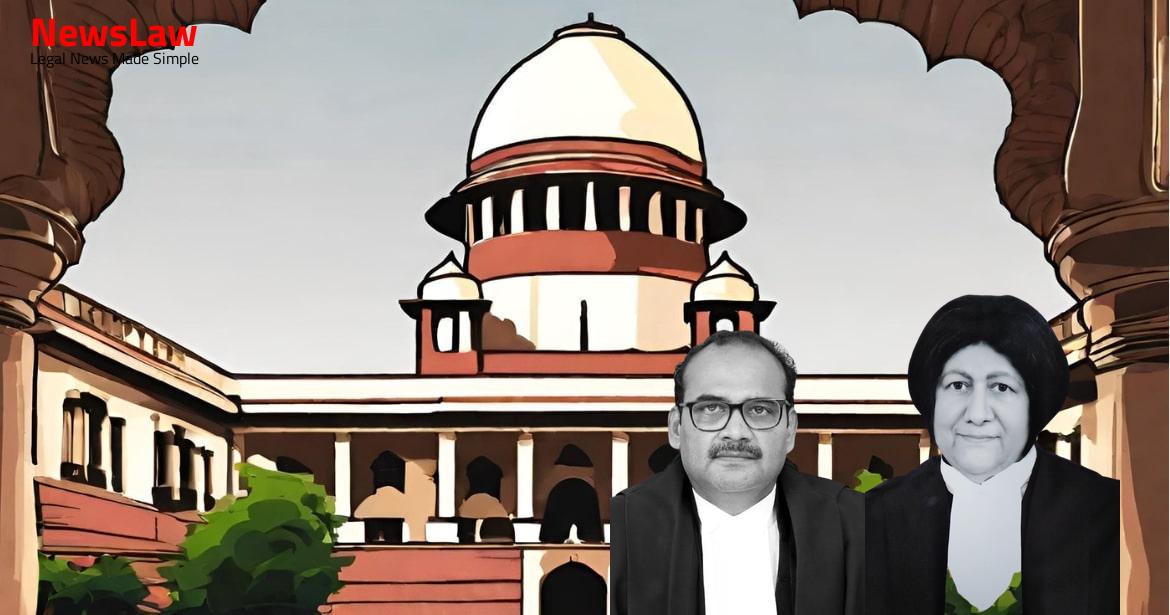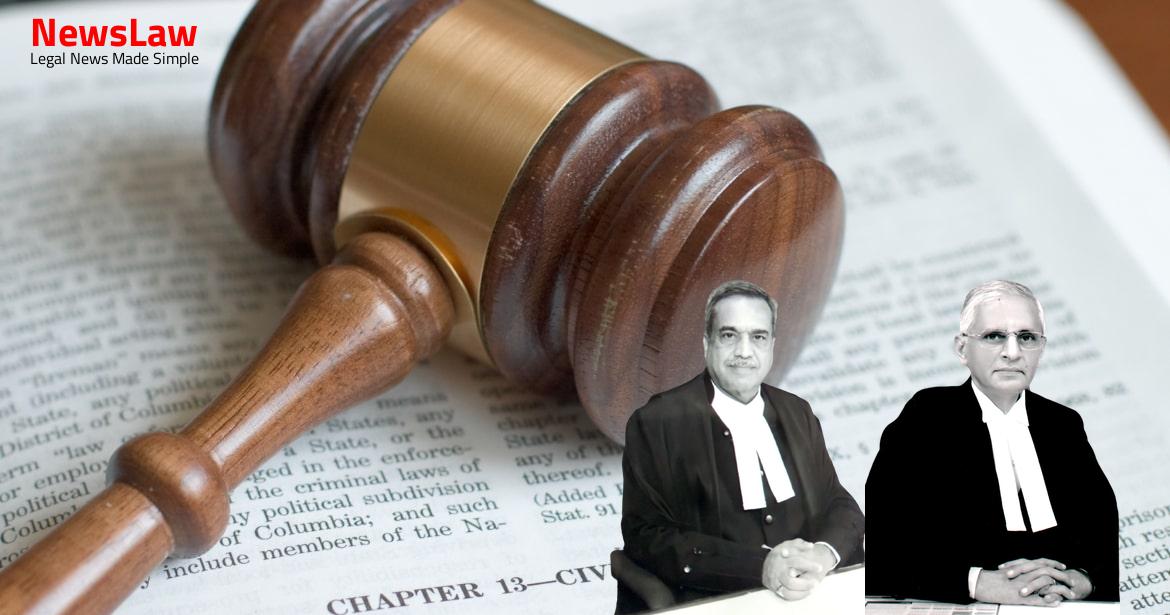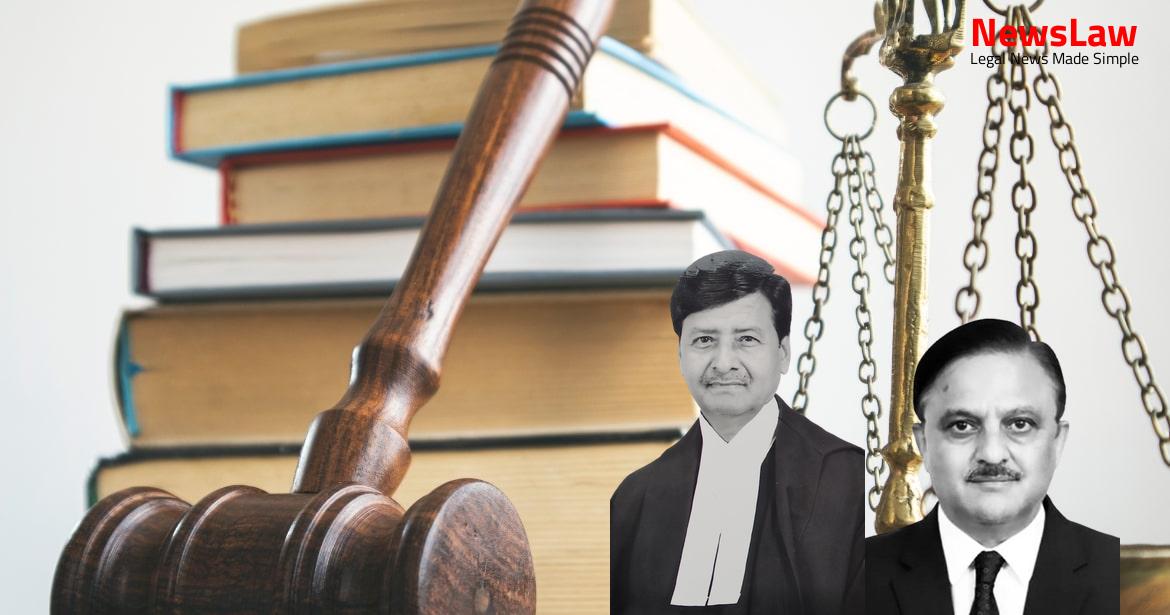Explore the deep dive into the legal analysis of a compelling weapons possession case where the court meticulously examines the evidence and intent presented by the prosecution. The case unravels the nuances of proving guilt beyond a reasonable doubt, showcasing the critical role of concrete evidence in establishing convictions in legal proceedings.
Facts
- The police parties surrounded the house of Jhallu Kachhi.
- Accused Rajesh Shukla did not surrender and instead opened fire on the police personnel from inside the house.
- Despite firing gun shots, the accused expressed a wish to surrender after some time.
- Accused Rajesh Shukla along with accused Vasudev Shukla surrendered and were taken into custody.
- Weapons recovered: 1 rifle with live and empty cartridges from Rajesh Shukla, and 1 double-barrel gun with live and empty cartridges from Vasudev Shukla.
- Dr. Sanjay Agrawal challenged the accused to surrender and come out of the house.
- Case registered on priority basis due to the appellant being a senior citizen.
- Prosecution’s case detailed – police parties mobilized to apprehend the absconding accused Rajesh Shukla in Village Mahoi Kala.
- Police prepared to arrest the accused under the command of Dr. Sanjay Agrawal.
- Accused Vasudev claimed to have surrendered his son Rajesh previously.
- 16 witnesses examined by prosecution, no witnesses examined by the accused in defense.
- Judgment passed by High Court confirmed the lower court’s decision.
- Charges under various sections including attempted murder and Arms Act framed against the accused.
- Both accused denied guilt and claimed false implication.
- Weapons seized at police station with live cartridges after surrendering by the accused.
- Accused convicted for possessing guns without license and being aware of police challenge
- Accused sentenced to Rigorous Imprisonment for various durations and fines
- Appeal filed to High Court, one appellant’s appeal abated due to death
- High Court dismissed remaining appellant’s appeal, confirming Trial Court’s judgment
- Seized guns found to be operational, supported by FSL Report
- Sentences to run concurrently as directed by the Court
Also Read: Analysis of Financial Statements as Acknowledgment in Limitation Act Case
Arguments
- Appellant’s counsel argues that there was no apprehension of abscondment by the appellant according to the prosecution’s case
- The right barrel of the gun was not used in firing, making it impossible to match the weapon with the cartridges
- FSL report shows disparity in matching the firing pin impression to the cartridges
- Reference made to the case of Parsuram Pandey vs State of Bihar for supporting argument
- Deceased co-accused was allegedly hiding at a different location, not with the appellant
- Witnesses did not see the appellant firing with intention to commit murder
- Seizure report indicates the type and quantity of weapons and cartridges found with the appellant
- Witnesses did not see any of the accused firing at the police party
- The direction of the fired shots was towards the hill, not at the accused persons according to witness statement
- Prosecution failed to prove intent and knowledge to commit an act amounting to attempted murder
- Argument that conviction under Section 307/34 of IPC is contrary to established legal principles
- The State represented by Shri Mukul Singh argues in favor of the conviction and sentence of the appellant.
- The right barrel of the 12 bore gun seized from the appellant was cut and short, rendering it incapable of firing.
- FSL report Exb. P-17A indicates that the empty cartridges were not fired from the left barrel of the gun.
- The offence under Section 27 of the Arms Act is reasoned to not be established.
- Even if the offence under Section 25(1-B)(a) is considered, the sentence awarded by the Trial Court of two years has already been served by the appellant.
- It is suggested that the appellant should be released upon setting aside the conviction and sentence for the offences under Sections 307/34 and 27 of the Arms Act.
Also Read: Landmark Legal Analysis in Conviction Appeal Case
Analysis
- The prosecution witnesses did not see the appellant firing on the police party with intention to commit an offence, casting doubt on his guilt.
- Rajesh Shukla and the appellant surrendered with guns before the police party, indicating lack of intention or knowledge to harm the police.
- Arrest and seizure proceedings were conducted at the police station, not on the actual spot of the incident, raising doubts in the prosecution’s case.
- The defense presented by the appellant seems plausible and creates reasonable doubt in proving his guilt.
- Key prosecution witnesses did not establish the use of the gun seized from the appellant, along with live and empty cartridges.
- The High Court’s decision to convict the appellant was based on vague reasons and not concrete evidence.
- Independent witnesses present at the scene did not support the prosecution’s case, further weakening the evidence.
- The prosecution failed to prove the appellant’s involvement beyond reasonable doubt, highlighting the lack of concrete evidence.
- The use of the gun was not confirmed by the FSL report, leading to doubts about the conviction under the Arms Act.
- The FSL report indicated that the gun could not have fired the empty cartridges found at the scene.
- The Trial Court and High Court erred in convicting the appellant for the charges under Section 307/34 IPC read with Section 27 Arms Act.
- The appeal is allowed in part, setting aside the conviction and sentence for the said charges, and acquitting the appellant except for the charge under Section 25(1B)(a) of the Arms Act.
- The ingredients of Section 307/34 IPC and Section 27 of the Arms Act have not been proved by the prosecution beyond reasonable doubt.
- The guilt of the accused/appellant has not been proven based on the lack of evidence supporting the charges.
Also Read: Analysis of Territorial Jurisdiction in Arbitration Transfer Petition
Decision
- The appellant has already served the sentence for the charge under Section 25(1B)(a) of the Arms Act.
- If the appellant is not required in any other case, he should be released forthwith from jail.
- The appeal is allowed in part and disposed of.
Case Title: VASUDEV Vs. STATE OF M.P. (2022 INSC 135)
Case Number: Crl.A. No.-000388-000388 / 2021



